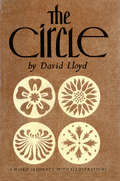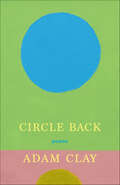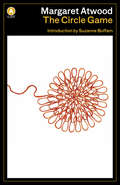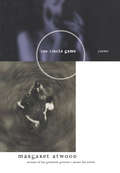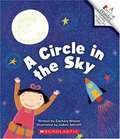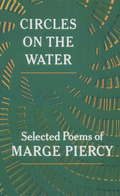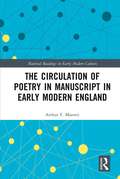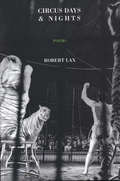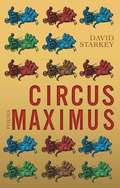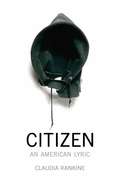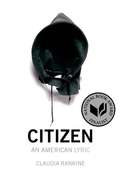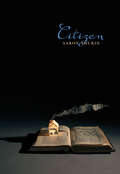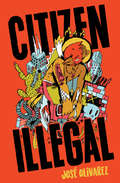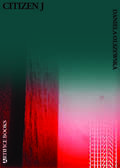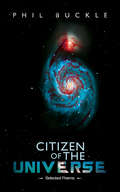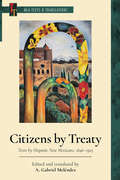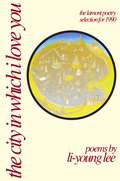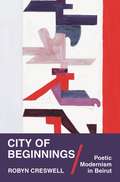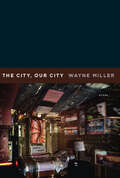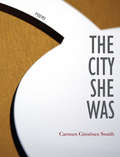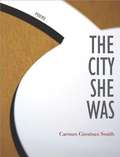- Table View
- List View
The Circle
by David LloydDavid Lloyd's verses are a genuine contribution to the literature of haiku. They capture an image, a moment in time, and engrave it in the memory for all time.
Circle Back: Poems
by Adam ClayAn aching meditation on the cyclical nature of grief and memory’s limited capacity to preserve everything time takes from us.How does one make sense of loss—personal and collective? When language and memory are at capacity, where do we turn? Confronted with “a year meant to end all / those to come,” acclaimed poet Adam Clay questions whether anything is “wide enough to contain what’s left / of hope.” In the absence of a clear way forward, the poems of Circle Back wander grief’s strange and winding path. Along the way, the line between reality and dreams blurs: cows stare with otherworldly eyes, 78s play under cactus needles, a father becomes his own child, and the dead become something more complicated—a “sketch turned to painting / left in a room dusty from / lack of passing through.”But amidst these liminal landscapes, a “thread of promise” persists in poetry. As flawed as language is, we still turn to it for longevity, for love, like “Keats, / sketching himself back into place.” Vulnerable and nuanced, Clay details the difficult work of healing—and in doing so, captures those needful moments of reprieve in grief’s “strange circle.” Two friends dashing through a sprinkler. A garden of startled birds. Out for a run some gray morning: a sudden patch of wildflowers. Circle Back is a bared heart, one readers will find as thoughtful as it is tender.
The Circle Game (A List)
by Margaret AtwoodThe appearance of Margaret Atwood's first major collection of poetry marked the beginning of a truly outstanding career in Canadian and international letters. The voice in these poems is as witty, vulnerable, direct, and incisive as we've come to know in later works, such as Power Politics, Bodily Harm, and Alias Grace. Atwood writes compassionately about the risks of love in a technological age, and the quest for identity in a universe that cannot quite be trusted. Containing many of Atwood's best and most famous poems, The Circle Game won the 1966 Governor General's Award for Poetry and rapidly attained an international reputation as a classic of modern poetry.
The Circle Game (A List)
by Margaret AtwoodThe appearance of Margaret Atwood's first major collection of poetry marked the beginning of a truly outstanding career in Canadian and international letters. The voice in these poems is as witty, vulnerable, direct, and incisive as we've come to know in later works, such as Power Politics, Bodily Harm, and Alias Grace. Atwood writes compassionately about the risks of love in a technological age, and the quest for identity in a universe that cannot quite be trusted. Containing many of Atwood's best and most famous poems, The Circle Game won the 1966 Governor General's Award for Poetry and rapidly attained an international reputation as a classic of modern poetry. This beautiful edition of The Circle Game contains the complete collection, with an introduction by Sherrill E. Grace of the University of British Columbia.
A Circle in the Sky
by Zachary WilsonA child puts together various simple shapes to build a rocket that will fly to the moon.
Circles on the Water
by Marge PiercyMore than 150 poems from her seven books of poetry written between 1963 and 1982.From the Trade Paperback edition.
The Circulation of Poetry in Manuscript in Early Modern England (Material Readings in Early Modern Culture)
by Arthur F. MarottiThis study examines the transmission and compilation of poetic texts through manuscripts from the late-Elizabethan era through the mid-seventeenth century, paying attention to the distinctive material, social, and literary features of these documents. The study has two main focuses: the first, the particular social environments in which texts were compiled and, second, the presence within this system of a large body of (usually anonymous) rare or unique poems. Manuscripts from aristocratic, academic, and urban professional environments are examined in separate chapters that highlight particular collections. Two chapters consider the social networking within the university and London that facilitated the transmission within these environments and between them. Although the topic is addressed throughout the study, the place of rare or unique poems in manuscript collections is at the center of the final three chapters. The book as a whole argues that scholars need to pay more attention to the social life of texts in the period and to little-known or unknown rare or unique poems that represent a field of writing broader than that defined in a literary history based mainly on the products of print culture.
Circus Days and Nights
by Robert LaxJack Kerouac called Robert Lax "one of the great original voices of our times...a Pilgrim in search of beautiful innocence, writing lovingly, finding it, simply, in his own way." Though many hold him to be one of the greatest American poets of this century, Lax has maintained a low profile, living and writing in seclusion on the Greek island of Patmos. In Circus Days & Nights, Lax's three great long poems on the circus--"Circus of the Sun," "Mogador's Book," and "Sunset City"--are collected together for the first time, placing this early masterwork in the position within American literature that it so richly deserves. Each of the three poems in this collection expresses a reverence for the acts of daring, beauty, and grace that make the circus the singular event it is. What also emerges is the drawing of a link between this world of the circus--wherein a tent is erected, acts are performed, and then the tent is disassembled only to be re-erected the next day--and Lax's faith. As Denise Levertov has said, "the radiant security of Lax's faith appears in his work as a serenity of tone."
Circus Days and Nights
by Robert LaxJack Kerouac called Robert Lax “one of the great original voices of our times…a Pilgrim in search of beautiful innocence, writing lovingly, finding it, simply, in his own way.” Though many hold him to be one of the greatest American poets of this century, Lax has maintained a low profile, living and writing in seclusion on the Greek island of Patmos. In Circus Days & Nights, Lax's three great long poems on the circus—“Circus of the Sun,” “Mogador's Book,” and “Sunset City”—are collected together for the first time, placing this early masterwork in the position within American literature that it so richly deserves. Each of the three poems in this collection expresses a reverence for the acts of daring, beauty, and grace that make the circus the singular event it is. What also emerges is the drawing of a link between this world of the circus—wherein a tent is erected, acts are performed, and then the tent is disassembled only to be re-erected the next day—and Lax's faith. As Denise Levertov has said, “the radiant security of Lax’s faith appears in his work as a serenity of tone.”
Circus Days and Nights
by Robert Lax"Perhaps the greatest English language poem of this century" (The New York Times)-finally in paperback! Jack Kerouac called Robert Lax "one of the great original voices of our times. . . a Pilgrim in search of beautiful innocence, writing lovingly, finding it, simply, in his own way. " Though many hold him to be one of the greatest American poets of the 20th century, Lax maintained a low profile, living and writing in seclusion on the Greek island of Patmos. In Circus Days and Nights, Lax's three great long poems on the circus-"Circus of the Sun," "Mogador's Book," and "Sunset City"-are collected together for the first time, placing this early masterwork in the position within American literature that it so richly deserves.
Circus Maximus
by David StarkeyWhat would the Son-of-Man get up to in present-day Rome? Would he wander the Galleria Borghese, loiter outside nightclubs, ride trams, tip accordionists? How would Keats feel about the neon Dior sign that flashes away above the Spanish Steps? Are there ways to avoid Vespas on the sidewalks? Rules for carving a Pietà? And exactly which painter is responsible for the ugliest Jesus in the history of Western Art?A tour of Rome like no other, the poems of Circus Maximus ask these questions and more. Join David Starkey as he shines a torch on the sights, sounds, mysteries and metaphors of the Eternal City.David Starkey is the former Poet Laureate of Santa Barbara, a senior Fulbright scholar, and a six-time nominee for the Pushcart Prize. His latest volume of poetry is A Few Things You Should Know About the Weasel (Biblioasis, 2010).
Citizen: An American Lyric
by Claudia RankineA provocative meditation on race, Claudia Rankine’s long-awaited follow up to her groundbreaking book Don’t Let Me Be Lonely: An American Lyric<P><P> Claudia Rankine’s bold new book recounts mounting racial aggressions in ongoing encounters in twenty-first-century daily life and in the media. Some of these encounters are slights, seeming slips of the tongue, and some are intentional offensives in the classroom, at the supermarket, at home, on the tennis court with Serena Williams and the soccer field with Zinedine Zidane, online, on TV—everywhere, all the time. The accumulative stresses come to bear on a person’s ability to speak, perform, and stay alive. Our addressability is tied to the state of our belonging, Rankine argues, as are our assumptions and expectations of citizenship. In essay, image, and poetry, Citizen is a powerful testament to the individual and collective effects of racism in our contemporary, often named “post-race” society.
Citizen: An American Lyric
by Claudia Rankine* Finalist for the National Book Award in Poetry ** Winner of the National Book Critics Circle Award in Poetry * Finalist for the National Book Critics Circle Award in Criticism * Winner of the NAACP Image Award * Winner of the L.A. Times Book Prize * Winner of the PEN Open Book Award *ONE OF THE BEST BOOKS OF THE YEAR:The New Yorker, Boston Globe, The Atlantic, BuzzFeed, NPR. Los Angeles Times, Publishers Weekly, Slate, Time Out New York, Vulture, Refinery 29, and many more . . .A provocative meditation on race, Claudia Rankine's long-awaited follow up to her groundbreaking book Don't Let Me Be Lonely: An American Lyric.Claudia Rankine's bold new book recounts mounting racial aggressions in ongoing encounters in twenty-first-century daily life and in the media. Some of these encounters are slights, seeming slips of the tongue, and some are intentional offensives in the classroom, at the supermarket, at home, on the tennis court with Serena Williams and the soccer field with Zinedine Zidane, online, on TV-everywhere, all the time. The accumulative stresses come to bear on a person's ability to speak, perform, and stay alive. Our addressability is tied to the state of our belonging, Rankine argues, as are our assumptions and expectations of citizenship. In essay, image, and poetry, Citizen is a powerful testament to the individual and collective effects of racism in our contemporary, often named "post-race" society.
Citizen
by Aaron Shurin"His writing folds the mundane and the mythic in with deep images of personal archetype. The passing moments in which the poems possessed Shurin are held fresh to the page in a dazzled string of trigger-touches. They hint of lingering spiral passages, personal journeys, which lie just below such occasions."-- Patrick Dunagan,The Critical FlameWidely acclaimed for his lyrical language and innovative verse, Aaron Shurin brings the prose poem into new richness and complexity in Citizen. Through shape-shifting sentences and sensuous imagery he explores the nuances of civic and domestic life, the twists and turns of desire, and the mysterious shimmer of objects. Traveling across the borders of cities and the boundaries of form, he crafts a dazzling vision of daily life as a citizen of the imagination.Aaron Shurin is the author of over ten books, most recently King of Shadows, a collection of personal essays. He lives and works in San Francisco, California.
Citizen Illegal
by José Olivarez&“Olivarez steps into the &‘inbetween&’ standing between Mexico and America in these compelling, emotional poems. Written with humor and sincerity&” (Newsweek). Named a Best Book of the Year by Newsweek and NPR. In this &“devastating debut&” (Publishers Weekly), poet José Olivarez explores the stories, contradictions, joys, and sorrows that embody life in the spaces between Mexico and America. He paints vivid portraits of good kids, bad kids, families clinging to hope, life after the steel mills, gentrifying barrios, and everything in between. Drawing on the rich traditions of Latinx and Chicago writers like Sandra Cisneros and Gwendolyn Brooks, Olivarez creates a home out of life in the in-between. Combining wry humor with potent emotional force, Olivarez takes on complex issues of race, ethnicity, gender, class, and immigration using an everyday language that invites the reader in, with a unique voice that makes him a poet to watch. &“The son of Mexican immigrants, Olivarez celebrates his Mexican-American identity and examines how those two sides conflict in a striking collection of poems.&” —USA Today
Citizen J
by Daniela OlszewskaCitizen J hides in underground forests, worries that her toasters are miked, finds bombs in unusual places, tries her hand at piloting and cowboy human resources. She marries twelve husbands, marries twelve wives. In this series of interconnected poems, reminiscent at once of Heather Christle and John Berryman, Olszewska's everywoman hero moves across a landscape that might be America re-imagined as a post-Soviet state: surreal, contradictory.
Citizen of the Universe: Selected Poems
by Phil BucklePhil Buckle began writing poetry when he retired in his fifties from a professional career as a jazz and rock drummer. His creative imagination and rhythmic invention, plus his native Birmingham wit and intelligent curiosity about life, the universe and everything, inspire his work and give it a unique and powerful edge.
Citizens by Treaty: Texts by Hispanic New Mexicans, 1846–1925 (MLA Texts and Translations #46)
by A. Gabriel MeléndezThis volume gathers works produced by Spanish-speaking people of Mexican descent who became United States citizens by virtue of the Treaty of Guadalupe Hidalgo (1848) and whose ancestors had resided in New Mexico, Arizona, California, Texas, and Colorado for hundreds of years prior to the Mexican-American War. The writings in this collection, drawn from various genres, were composed at a time marked by the confluence of tradition and change. In addition to facing unprecedented challenges to their rights, livelihoods, language, and religion, the writers experienced the arrival of the railroad, the telegraph, film, and radio; they fought in the American Civil War, the Spanish-American War, and World War I; and they saw Arizona and New Mexico gain statehood in 1912. This anthology of songs, poems, speeches, and journalism shows the persistence of a vibrant culture in the face of upheaval and change.
The City in Which I Love You (American Poets Continuum)
by Li-Young LeeContentsI.Furious VersionisII.The InterrogationThis Hour And What Is DeadArise, Go DownMy Father, In Heaven, Is Reading Out LoudFor A New Citizen Of These United StatesWith RuinsIII.This Room And Everything In ItThe City In Which I Love YouIV.The WaitingA StoryGoodnightYou Must SingHere I AmA Final ThingV.The Cleaving
The City in Which I Love You
by Li-Young LeeContentsI.Furious VersionisII.The InterrogationThis Hour And What Is DeadArise, Go DownMy Father, In Heaven, Is Reading Out LoudFor A New Citizen Of These United StatesWith RuinsIII.This Room And Everything In ItThe City In Which I Love YouIV.The WaitingA StoryGoodnightYou Must SingHere I AmA Final ThingV.The Cleaving
City of Beginnings: Poetic Modernism in Beirut (Translation/Transnation #41)
by Robyn CreswellHow poetic modernism shaped Arabic intellectual debates in the twentieth century and beyondCity of Beginnings is an exploration of modernism in Arabic poetry, a movement that emerged in Beirut during the 1950s and became the most influential and controversial Arabic literary development of the twentieth century. Robyn Creswell introduces English-language readers to a poetic movement that will be uncannily familiar—and unsettlingly strange. He also provides an intellectual history of Lebanon during the early Cold War, when Beirut became both a battleground for rival ideologies and the most vital artistic site in the Middle East. Arabic modernism was centered on the legendary magazine Shi‘r (“Poetry”), which sought to put Arabic verse on “the map of world literature.” The Beiruti poets—Adonis, Yusuf al-Khal, and Unsi al-Hajj chief among them—translated modernism into Arabic, redefining the very idea of poetry in that literary tradition. City of Beginnings includes analyses of the Arab modernists’ creative encounters with Ezra Pound, Saint-John Perse, and Antonin Artaud, as well as their adaptations of classical literary forms. The book also reveals how the modernists translated concepts of liberal individualism, autonomy, and political freedom into a radical poetics that has shaped Arabic literary and intellectual debate to this day.
The City, Our City: Poems
by Wayne Miller“[A] wide-ranging, fascinating series of poems that [has] the city as character at its center, the city as a collective soul, the city as idea.” —Sycamore ReviewA William Carlos Williams Award FinalistA Kansas City Star Top Book of the YearA Library Journal Top Winter Poetry PickA series of semi-mythologized, symbolic narratives interspersed with dramatic monologues, the poems collected in The City, Our City showcase the voice of a young poet striking out, dramatically, emphatically, to stake his claim on “the City.” It is an unnamed, crowded place where the human questions and observations found in almost any city—past, present, and future—ring out with urgency. These poems—in turn elegiac, celebratory, haunting, grave, and joyful—give hum to our modern experience, to those caught up in the City’s immensity, and announce the arrival of a major new contemporary poet.
The City She Was (Mountain West Poetry Series)
by Carmen Giménez Smith Carmen Giménez SmithMountain West Poetry Series Published by the Center for Literary Publishing at Colorado State University
The City She Was
by Carmen Giminez Smith"When you open this book, expect serious role-playing and syntactic tap dancing. The City She Was presents a world that brings 'the horizon line into your lexicon' and a poet's muse ('The Endangered You') is lent to a friend and returned 'a little more frayed.' Giménez Smith muddles and enchants with her many masks, leaving the ground a little less stable under our feet." -Matthea Harvey, author of Modern Life, Sad Little Breathing Machine, and Pity the Bathtub Its Forced Embrace of the Human Form
